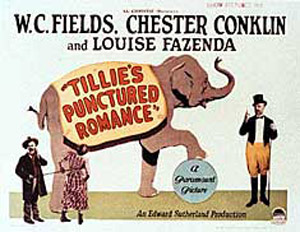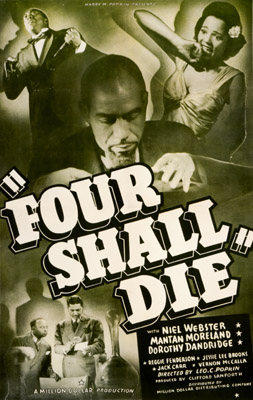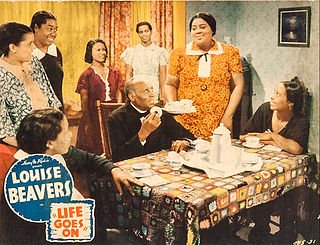
Louise Beavers was an American film and television actress who appeared in dozens of films and two hit television shows from the 1920s to 1960. She played a prominent role in advancing the lives of Black Americans through her work and collaborated with fellow advocates to improve the social standing and media image of the Black population.

The Duke Is Tops is a 1938 American musical film released by Million Dollar Productions and directed by William Nolte. The film was later released in 1944 under the title The Bronze Venus. It features top-billed Lena Horne in her film debut, along with Ralph Cooper. The film was one of the low-budget musical film "race movies" made in the 1930s and 1940s for the African-American market. The casts and production teams of these films were almost all black, and the music reflected current tastes in jazz and rhythm and blues.

The Flying Ace is a 1926 black-and-white silent drama film directed by Richard E. Norman with an all-African-American cast. This film was inspired by Bessie Colman and six-reel film, made by Norman Studios in Jacksonville, Florida, utilized a mix of professionals such as leads Laurence Criner and Kathryn Boyd, and non-professional actors.

Tillie's Punctured Romance is a 1928 American silent circus comedy film starring W. C. Fields as a ringmaster and Louise Fazenda as a runaway. Written by Monte Brice and Keene Thompson and directed by A. Edward Sutherland, this film has nothing to do with the 1914 Charlie Chaplin film aside from sharing the same title, but Chester Conklin and Mack Swain appear in both films.

Midnight Shadow is a 1939 film with an all African-American cast. It was directed and produced by George Randol, who was also African American.
Midnight Life is a 1928 silent mystery film produced by independent Gotham Company and distributed by B movie studios Lumas Films. The film is based on a novel, The Spider's Web, by Reginald Wright Kauffman. It was directed by Scott R. Dunlap and stars Francis X. Bushman and Gertrude Olmstead. This film is preserved at the Library of Congress.
Lucky Ghost is a 1942 American film directed by William Beaudine. The film is a sequel to the 1941 film Mr. Washington Goes to Town. The film is also known as Lady Luck.

Wide Open is a 1930 American pre-Code romantic comedy film directed by Archie Mayo, starring Edward Everett Horton and Patsy Ruth Miller, and featuring Louise Fazenda, T. Roy Barnes and Edna Murphy. Released by Warner Bros., it is based on the 1924 novel The Narrow Street by Edward Bateman Morris.

Four Shall Die is a 1940 American supernatural crime film directed by William Beaudine. It features Dorothy Dandridge in her first credited film role.

Laurence Criner born John Laurence Criner, occasionally credited as J. Lawrence Criner, was an actor in the United States. An African-American, he had numerous film roles including as the male lead and star.

Million Dollar Productions was a movie studio in the United States active from 1937 until 1940. It was established to produce films with African American casts. It was a partnership between Harry M. Popkin, Leo C. Popkin and Ralph Cooper.
Bargain with Bullets is a 1937 American film. The first film produced by Million Dollar Productions, it features an African American cast of actors and performers. The gangster film is about the Harlem underworld. It was described as the first Hollywood "all-Negro" film. The film features several musical performances.
While Thousands Cheer is a lost American film released in 1940. Leo C. Popkin directed. It was the only football-themed film with an African American lead character for decades. It starred Kenny Washington, a football star from UCLA who went on to become the first African American in the NFL after initially being refused an opportunity to play in the league due to segregation.
Edward Thompson (1898–1960) was an actor in the United States. He appeared in several films with African American casts. He worked on films with his wife Evelyn Preer, Spencer Williams, and other prominent African American actors including in Al Christie productions. He played in various theater productions as an actor, including in a musical dancing role in Darktown Follies.

Gang Smashers, also released as Gun Moll, is an American film released in 1938. It features an African American cast. Leo C. Popkin directed the Million Dollar Productions film from a screenplay by Ralph Cooper. The University of South Carolina libraries have an 8-page pressbook for the film. Nina Mae McKinney stars in the film a thriller about the Harlem underworld and racketeering.
Reginald Hartley Fenderson was an American actor in theatrical productions and films in the United States. He appeared in various films with African American casts in the 1930s and 1940s.
Gang War is an American film released in 1940. It features an African American cast and was directed by Leo C. Popkin. It was produced by Million Dollar Productions. The film is about the rivalry between two gangs.
Oft in the Silly Night is an American short comedy film released in 1929. It was produced by Al Christie from a story by Octavus Roy Cohen, part of a series published in the Saturday Evening Post and adapted to film in Christie productions. Among the early "talkie" films featuring an African American cast, the film survives and is available online.
Reform School is a 1939 Million Dollar Productions American film produced by Harry M. Popkin, directed by Leo C. Popkin, written by Joseph O'Donnell and Hazel Jamieson and starring Louise Beavers.
Am I Guilty? is a 1940 American film directed by Samuel Neufeld for the Supreme Pictures Corporation. The film's producer A. W. Hackel, who had founded Supreme Pictures, planned a series of films featuring black casts, but Am I Guilty? was the only one to be released. The screenplay was cowritten by Earle Snell and George Wallace Sayre based on a story by Sherman Lowe.









